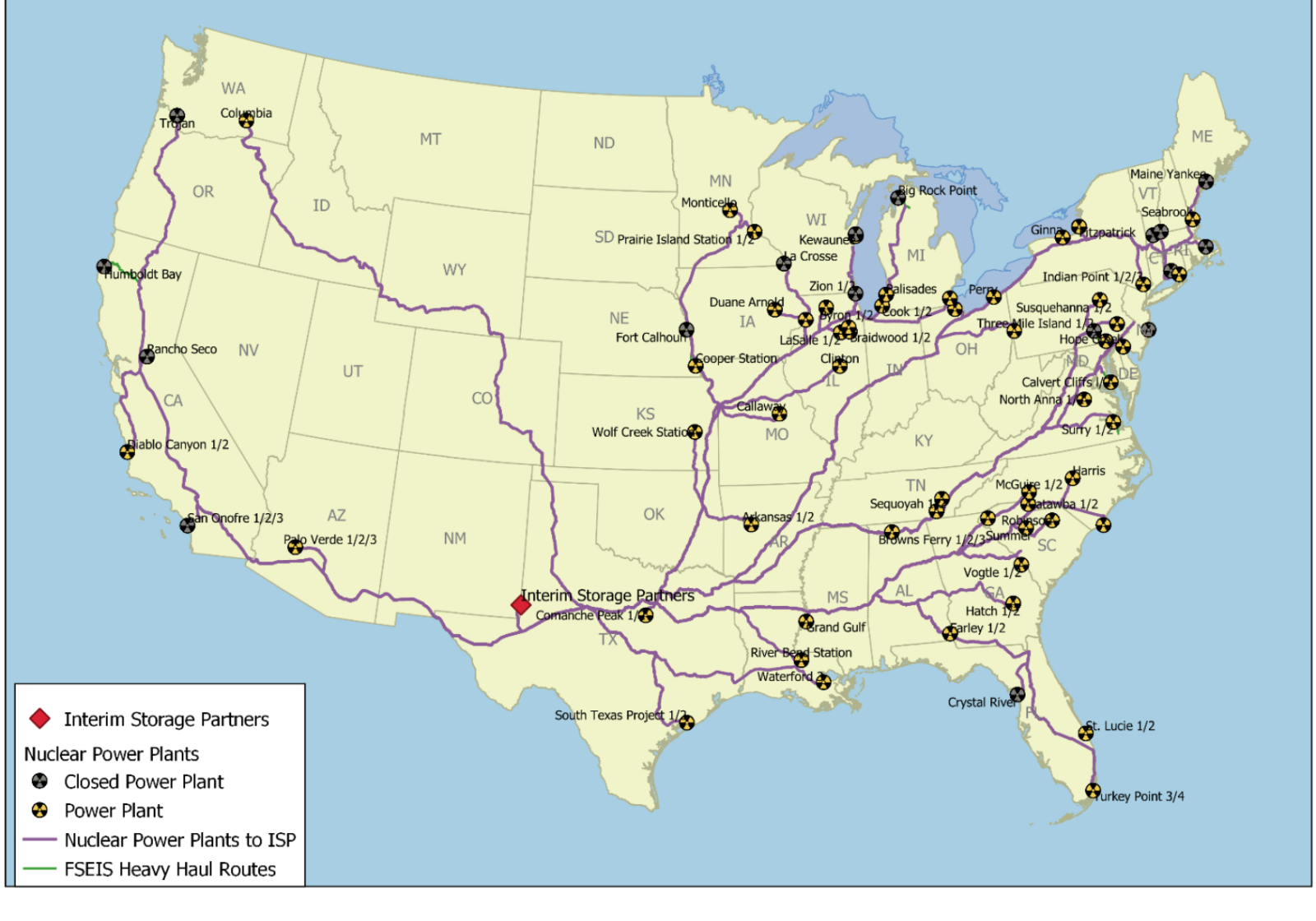CISFs would automatically double transport risks!

Consolidated interim storage facilities (CISFs) for highly radioactive irradiated nuclear fuel would automatically double already high transportation risks. First the wastes would be shipped from the nuclear power plants where they are currently stored, to a CISF. But someday — or some decade, or some century, depending on how long the CISFs would sit there — those very same wastes would have to be shipped again, away from the CISF, to a permanent geological repository. This could even be right back in the same direction from which the wastes came in the first place. This is a non-starter, a dangerous game of musical chairs, hot potato, and radioactive Russian roulette on our nation’s roads, rails, and waterways!
The risks are real. See, immediately below, the Western Interstate Energy Board’s (WIEB) comments to the U.S. Nuclear Regulatory Commission (NRC) in November 2020 re: the proposed CISF called Interim Storage Partners in West Texas, right on the New Mexico state line.
2020-nov-wieb-hlrwc-comments-on-deis-for-isp-cisf-1Note especially Figure 2 on Page 6. The map shows the transport routes from nuclear power plants across the country, to ISP’s CISF in West Texas, that would most likely be used.
Also linked here is Figure 2 on Page 6.
Figure 2 is also the featured image accompanying this website post, viewable above.
This map is very valuable. NRC and ISP have largely to entirely concealed such shipping routes thus far for the past several years. NRC has even licensed ISP for construction and operation, in September 2021, despite protests by groups like Don’t Waste Michigan and Sierra Club, over the secrecy regarding the routes, the risks not being addressed in NRC’s Environmental Impact Statement and ISP’s Environmental Report, etc.
The WIEB comments also address the transport risk “Region of Influence.” The State of Nevada, a member of WIEB, scored a great victory for safety, security, public health, and environmental protection, when it successfully won a hearing on the merits, from the NRC Atomic Safety and Licensing Board presiding over the long-stalled Yucca Mountain permanent geologic repository licensing proceeding, regarding such transport risk/impact Regions of Influence. See the State of Nevada’s Region of Influence contention here:
NEV-NEPA-05 Regions of Influence-1The Region of Influence is an acknowledgement that out to a distance of 0.5 miles on either side of a high-level radioactive waste transport route, the routine emissions of gamma and neutron radiation from passing high-level radioactive waste shipments will take place, have an impact, and thus represent a hazard.
It should be noted that externally contaminated shipping containers will significantly increase such risks and impacts. Orano, formerly known as Areva, and known as Cogema before that — the French government owned radioactive waste company with a major U.S. presence — has an infamous track record in this regard. Orano had 25-33% of all waste shipments bound for its La Hague reprocessing facility in France with external contamination levels causing radiation dose rates in excess of allowable limits. This amounted to hundreds of shipments altogether. On average, the dose rates exceeded permissible by 500 times. In one case, actual dose rates exceeded allowable by 3,300 times. Orano is a major partner in ISP.
The Region of Influence for a breach of a shipping container, as due to a severe accident or an intentional attack, is much greater. The ROI for a breach is 50 miles on either side of the transport route. Such an ROI, for transport routes from nuclear power plants to ISP’s CISF in West Texas, likely includes many millions of residents, in a large number of states in the Lower 48.
Despite comments and contentions raised throughout NRC’s licensing proceeding and environmental and safety review of the ISP CISF license application, transport risks have been ignored, and routes have been kept secret. We must wake up the country, and the people living in the communities through which these routes pass, about the dangers of shipments to ISP.
Such transport risks are now the subject of federal appeals against NRC for licensing ISP last September, such as appeals brought by attorney Terry Lodge of Toledo, Ohio on behalf of Don’t Waste Michigan et al. (a national grassroots coalition of seven environmental groups), and by attorney Wally Taylor on behalf of Sierra Club. Fasken Land and Minerals, Ltd. and the Permian Basin Land and Royalty Owners have also raised transport risk comments, contentions, and now federal appeals. This has all contributed to the States of Texas and New Mexico doing the same. Multiple federal courts of appeal (in D.C., New Orleans, and Denver) are currently hearing these cases. The City of Fort Worth, Texas last March filed a Friend of the Court brief, expressing support for the federal appeals in the D.C. Circuit, concerned about the significant transport risk impacts ISP shipments would mean for its residents.
Support Beyond Nuclear
Help to ensure a safer, greener and more just world for all

